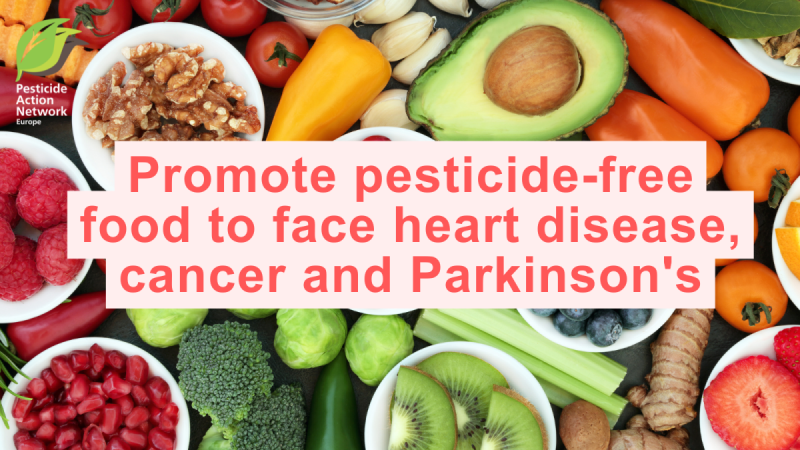If Europe is serious about tackling cardiovascular disease and other chronic illnesses such as Parkinson’s, it must look at what’s on our plates. What we eat — and how our food is grown — plays a key role in our wellbeing. Food full of fibre and vitamins is important, but not enough. Pollutants in soil, air, food and water are a major environmental threat, and exposure to pesticides has been linked with increased risk of heart diseases. For this reason, during World Heart Day, twenty organisations, including PAN Europe, urged the European Commission to place access to healthy, organically grown pesticide-free food at the core of the EU’s Cardiovascular Health Plan. Support is growing among health actors who call for a pesticide-free future that protects both people and the planet.
Cardiovascular diseases are Europe’s leading cause of death and disability. Human suffering is huge, and it costs the EU over €280 billion each year. Unhealthy diets are a major driver of these illnesses, and pesticides contribute in two key ways. First, exposure to contaminated soil, water, air and food with pesticides has been directly linked to an increased risk of heart disease. Second, the dramatic decline of bees and other pollinators, largely caused by heavy pesticide use, reduces the availability of healthy foods that are essential for preventing them.
For these reasons, on World Heart Day, together with other organisations, we sent a letter to the European Commission. We urged them to place measures to promote healthy, sustainable diets at the heart of the upcoming EU Cardiovascular Health Plan. [1]
Mobilisation of health professionals
An increasing number of scientific publications point to the harm caused by pesticides to people's health. That is why health actors are increasingly mobilised against pesticide-related chronic diseases such as cancers or Parkinson's disease. For example, French and Belgian Health Mutuals are starting a mobilisation against pesticides.
In a recent publication titled “Planetary Health”, several authors warn that actual chemical risks are unacceptable threats to public health, much like the dangers of asbestos were recognised decades ago. Addressing this requires a collective effort to rethink both our agricultural model and our social protection system, because our health depends on it. The proceeds from this publication will support our ongoing efforts at PAN Europe to advocate for a pesticide-free future and promote healthier food systems. [2]
Pesticides linked to Parkinson's disease and cancer
Despite clear scientific evidence showing that certain substances are harmful to health and the environment, many remain in use in the EU. Research indicates that certain pesticides negatively affect the brain development of children and are suspected to contribute to diseases such as Parkinson’s. However, pesticides are rarely tested for their long-term effects on the brain and nervous system before authorisation. And even when a substance is identified as dangerous, it can still remain in use for a long time. [3]
In addition, a recent U.S. study found that living in agricultural areas with heavy use of pesticides can raise cancer risk just as much as smoking. [4] Nevertheless, at least 15 pesticides suspected to be carcinogenic are still approved by the European Union. Glyphosate, classified as a probable carcinogen by the International Agency for Research on Cancer of the WHO, was approved by the EU for another 10 years in 2023 - a decision that PAN Europe and its members are challenging at the European Court of Justice. [5] Europe’s failing to classify glyphosate as a carcinogen, despite the scientific evidence, raises questions about whether there are more carcinogenic substances approved that haven’t been properly classified.
For these reasons, we advocate and call for urgent action and full enforcement of the European law regulations to protect our health from these unacceptable toxic threats. A sustainable and healthy agricultural and food production model is essential for us.
Notes:
[1] Placing Healthy, Affordable Diets at the Core of EU Cardiovascular Health Policy
[2] Santé planétaire. Le temps des solutions mutualistes
[3] Save our brain
[4] Heavy pesticide exposure poses similar cancer risk as smoking
[5] Next step: glyphosate approval is brought to the European Court of Justice
